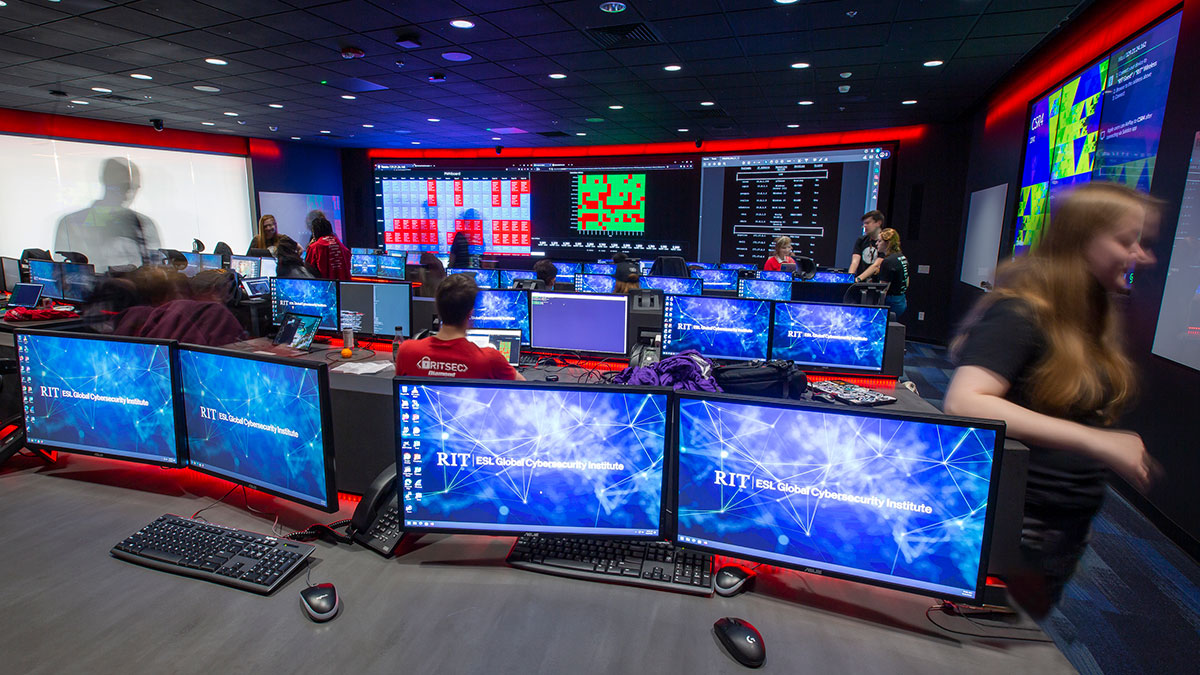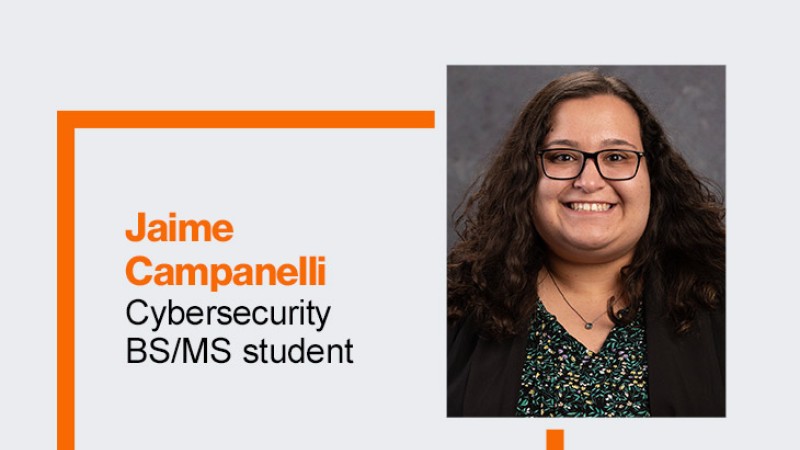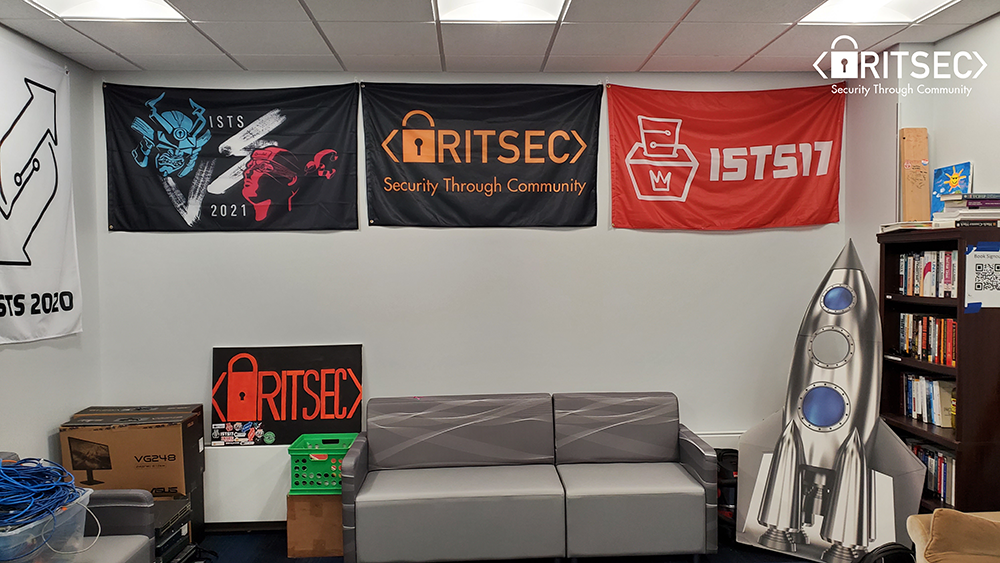Department of Cybersecurity

Department of
Cybersecurity
- RIT/
- Golisano College of Computing and Information Sciences/
- Academics/
- Departments and Schools/
- Department of Cybersecurity
Contact
Overview
The Department of Cybersecurity (CSEC) advances the state of the art in cybersecurity and provides students with the education they need to launch their careers as world-class cybersecurity professionals. CSEC students get a hands-on education in how to protect computers, networks, and data, and they take that into the world through co-op opportunities with industry leaders and security competitions. Students also work alongside expert faculty to investigate protecting connected cars, defending wireless communications in the Internet of Things, improving online privacy, and many other ways to secure our world.
18th
Ranked Cybersecurity program by US News & World Report
$92k
Median salary, according to Bureau of Labor Statistics
0%
Unemployment rate in cybersecurity field (Rasmussen)

RIT is designated as a National Center of Academic Excellence in Cyber Defense and Cyber Research by the National Security Agency.
Latest News
-
March 31, 2025

Cybersecurity expert weighs in on reported Signal usage by Trump admin
WHAM-TV speaks to Jonathan Weissman, principal lecturer in the Department of Cybersecurity, about the messaging app Signal.
-
March 28, 2025

‘Can happen to anyone’ really means ‘anyone’: abc27 meteorologist’s Facebook account hacked
WHTM-TV speaks to Jonathan Weissman, principal lecturer in the Department of Cybersecurity, about using authenticator apps to protect online accounts.
-
March 27, 2025

Cybersecurity expert explains the Signal app
NewsRadio WHAM 1180 chats with Jonathan Weissman, principal lecturer in the Department of Cybersecurity, about the war plans discussed using the Signal messaging app. (Interview starts at 4 minutes, 55 seconds.)
Featured Work and Profiles
-
RIT's AI Tools Help Journalists Identify Deepfakes
RIT experts are helping journalists and intelligence analysts detect digital deception
Read More about RIT's AI Tools Help Journalists Identify Deepfakes -
Making Self-Driving Vehicles Safer From Hacking
RIT cybersecurity researchers are preparing connected vehicle networks for the next stage of cybersecurity—the post-quantum era.
Read More about Making Self-Driving Vehicles Safer From Hacking -
CyberCorps Scholar Leads Cyber Safety Outreach
Jaime Campanelli educates students and senior citizens about online safety and cybersecurity careers as a NSF CyberCorps Scholarship for Service (SFS) recipient.
Read More about CyberCorps Scholar Leads Cyber Safety Outreach -
Meet Nishi Prasad
Last summer, Nishi Prasad completed a co-op with RIT and Eaton Corporation, testing embedded devices. The co-op opened doors for her at RIT as a student leader and connected her to the university and...
Read More about Meet Nishi Prasad
Industrial Advisory Board
The Cybersecurity Department at RIT's Industry Advisory Board (IAB) comprises cybersecurity executives who provide invaluable advice and guidance to the academic department. These board members help ensure that the department's programs are aligned with the current demands of the cybersecurity landscape, enhancing both the educational and research aspects of the curriculum. To learn more about our current IAB members, click here.
Undergraduate Programs
The Bachelor of Science degree in cybersecurity produces professionals who understand people and processes that impact information security. In addition to possessing state-of-the-art knowledge in the preservation of information assets, students become experts in the identification of cybersecurity vulnerabilities, proving an attack occurred, identifying its origin, assessing the damage, and designing strategies that ensure data can be recovered.
In RIT’s cybersecurity bachelor’s degree you’ll learn to preserve assets, identify security vulnerabilities, prove threats occurred, and design strategies for data recovery.
Learn more about the Cybersecurity BS programGraduate Programs
The Master of Science in cybersecurity gives students an understanding of the technological and ethical roles of cybersecurity in today’s society and its importance across the breadth of computing disciplines. The program enables students to develop a strong theoretical and practical foundation in secure computing, preparing them for leadership positions in both the private and public sectors.
The Ph.D. in computing and information sciences is a research degree that produces independent scholars, cutting-edge researchers, and well-prepared educators. You'll study with RIT's world-class computing faculty and take advantage of diverse academic offerings and modern facilities as you identify and research challenges within and beyond computing.
Learn more about the Computing and Information Sciences Ph.D. programEarn a cybersecurity master’s degree at RIT, recognized as a National Center of Academic Excellence in Cybersecurity Research and Education by the National Security Agency.
Learn more about the Cybersecurity MS programA graduate certificate in cybersecurity that develops a strong foundation in computing security in order to create secure network environments.
Learn more about the Cybersecurity Adv. Cert. programMinors and Immersions
With the prevalence of mobile computing, the advantages of cloud computing, the ubiquity of computing in general, and the issues of securing big data caused by the world-wide explosion of eBusiness and eCommerce today, secure computing environments and appropriate information management have become critical issues to all sizes and types of organizations. Therefore, there is a vital and growing need for all computing professionals to have a foundation in the issues critical to information security and how they apply to their specific disciplines. The minor consists of two required courses and three electives chosen by the student from the computing security advanced course clusters. There are many elective course choices to provide flexibility. Therefore, the minor provides any computing major outside of the computing security degree program with basic knowledge of the issues and technologies associated with computing security and allows students the opportunity to select a set of security electives that are complementary to their majors. Before beginning the minor in students must possess prerequisite knowledge that can be obtained from various programming sequences and courses in calculus and discrete math.
Learn more about the Cybersecurity Minor programWith the prevalence of data breaches and cyber-attacks, securing intellectual properties and customer’s personally identifiable information has become increasingly challenging in business, government, and academia. It is commonly recognized that a key factor for having a cyber-secured environment and operations is well-trained employees with good cyber hygiene. A small human error may lead to a disastrous cyber incident. The cybersecurity risk management minor is designed for students in non-computing majors who are interested in learning about cybersecurity and developing the knowledge and skills to support organizations in their efforts to protect their computing and informational resources. Students learn the basics of computing and cybersecurity and then gain knowledge and practice in cybersecurity policy and law, risk management, and business continuity plans in the event of a cybersecurity attack.
Learn more about the Cybersecurity Risk Management Minor programResearch
Learn more on the Global Cybersecurity Institute website or in the videos below.
Scholarships
Both the National Science Foundation and Department of Defense offer scholarships for service, designed to increase and strengthen the cadre of federal information assurance professionals that protect the government's critical information infrastructure.
Department of Defense Cyber Service Academy
NSF CyberCorps Scholarship for Service




















